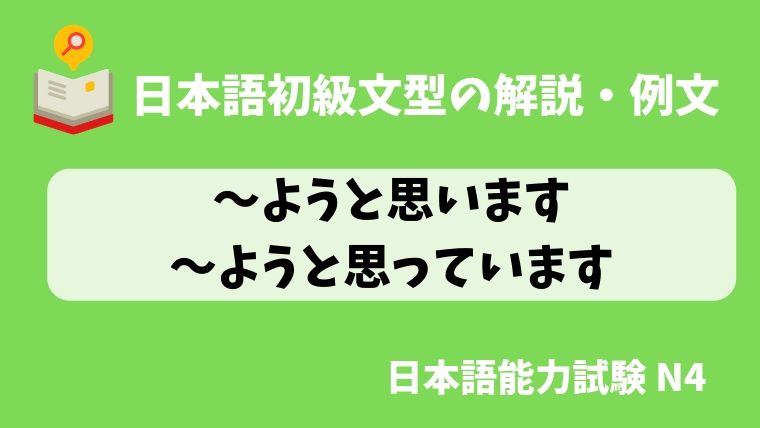(2025/07/12 08:56:34時点 Amazon調べ-詳細)
解説:〜ようと思う / 〜ようと思っています
●意味
話し手がこれから、あるいは将来何かをするという意志を聞き手に伝える表現。
An expression used by the speaker to convey their intention to do something in the near or distant future to the listener
●接続
V(意向形)+ と思う
V(意向形)+ と思っています
●日本語能力試験(JLPT)のレベル
N4
●備考
①「〜ようと思っています」は過去に決心し、今もずっとそう思っていることを伝える時に使う。
②「〜ようと思う」はその場で決心したことを、伝える時に使う。
① “〜ようと思っています” is used to convey that a decision was made in the past and the speaker has been thinking about it ever since.
② “〜ようと思う” is used to convey a decision made in the moment.
例文
日本語学校を卒業したら、国へ帰って日本語の先生になろうと思っています。
After graduating from Japanese school, I plan to return to my country and become a Japanese teacher.
私は将来、海外へ移住しようと思っています。
I am thinking of moving abroad in the future.
大学を卒業したら国へ帰ろうと思っています。
After graduating from college, I intend to return to my country.
今年はJLPTを受けようと思います。
I plan to take the JLPT this year.
先生、毎日この本を使って日本語を勉強しようと思っているんですが、いかがでしょうか。
Teacher, I’m thinking of studying Japanese every day using this book. What do you think?
将来は医者になろうと思っています。ジョンさんは?
I’m thinking of becoming a doctor in the future. How about you, John?
母の日には何かプレゼントをあげようと思っています。
I’m thinking of giving some presents on Mother’s Day.
来週、クリスマスパーティーをやろうと思っているんですが、先生も来ませんか?
I’m thinking of hosting a Christmas party next week. Would you like to come, Sensei?
仕事が早く終わったので、ちょっと同僚と飲みに行こうと思います。
Since I finished work early, I’m thinking of going for a drink with my colleagues.
疲れたので、今日はもう帰ろうと思います。
I’m tired, so I think I’ll go home now.
レポートは明日出そうと思います。
I think I will submit the report tomorrow.



